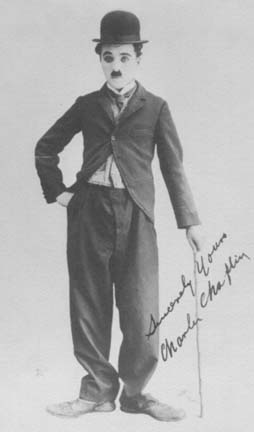Post by Slim K team on Apr 18, 2005 1:07:19 GMT -8
[glow=red,2,300]Charles Spencer Chaplin[/glow]
Hollywood Renegade & Founding Member of The Society of Independent Motion Picture Producers
Charlie Chaplin, my absolut hero and mentor a genius like NO other ... My deepest respect belongs to you
 ... slim k
... slim kCharles Spencer Chaplin was born in London/UK on April 16, 1889


Chalie Chaplin as " the Tramp" in 1922./ Charles Chaplin privat photo (Aberdeen Collection).
As writer, director and principle actor, Charlie Chaplin demonstrated an unparalleled degree of cinematic control that allowed him to infuse his movies with inventive dramatic structure and inimitable comedic signature. Chaplin is without equal among other writer-director-actors in terms of longevity and success.
As one of the movies' most richly talented filmmakers and creator of one of film's most indelible images, Chaplin is perhaps the most biographied figure in Hollywood history. Praise for his comic genius, however, obscures his cunning as film producer—the role which enabled him to sustain his versatile talents and cement the cultural endurance of his on-screen Tramp persona. Chaplin's influence as comedic force and cultural icon have overshadowed one of his most triumphant roles as independent filmmaker.
Chalie Chaplin as " the Tramp" in 1922.
As counterpoint to the whimsy of the Little Tramp, Chaplin served as his own financer and studio owner in charge of not only his filmmaking, but marketing and distribution. The unlikely combination of business skill and creative vision, in many ways, made Chaplin the forbearer of the creative Hollywood producer. Chaplin identifies both sides of his personality as a product of his childhood.
"When I was a little boy, the last thing I dreamed of was being a comedian," he said of his predilection for finances, "The only thing I really dreamed about was being rich. We were so poor that wealth seemed to me the summit."
Of his acting talent, he concluded later in his life, "I have never studied acting, but as a boy I was fortunate in living in an era of great actors, and I acquired an extension of their knowledge and experience." Chaplin's acting ability, far more expansive than the slapstick that made him a household name, was venerated by the illustrious John Barrymore in a well-known, albeit undocumented, Hollywood anecdote. When a movie director praised Barrymore as the world's greatest actor, Barrymore who died shortly thereafter in 1942 deflected the honor: "There are only two great actors—Charles Chaplin and Orson Welles."
Charles Chaplin Biography:
www.cobbles.com/simpp_archive/charlie-chaplin_biography.htm
about "GOLD RUSH"

Charles Chaplin. The Gold Rush. 1925. 35mm film, black and white, silent, 66 minutes (approx.).
Charlie Chaplin
The Gold Rush was the last movie Chaplin made before the specter of the "talkies" began to haunt him. Its brilliant set-pieces—Chaplin's character, the Little Tramp, performing the dance of the dinner rolls, Mack Swain hungrily mistaking the Tramp for a giant chicken, Swain and the Tramp feasting upon the latter's shoe, and the cabin teetering on the edge of the abyss—are among the highlights included in any assemblage of the classic moments of silent-film comedy. While all of Chaplin's silent features are somewhat episodic, they are held together by his sublime performances and inventive imagination.
The Gold Rush is Chaplin's most famous film, but it is atypical of his work in several ways. Its snowy wastes are far removed from his usual urban and rural settings. Cannibalism and murder seem peculiarly dark subjects for a comedy made in the middle of the twentieth century's most upbeat decade. The film also ends strangely, with the Tramp marrying and becoming a millionaire. The Gold Rush captured Chaplin in a time of relative contentment—one of the century's great geniuses at a moment of confidence in his ability to control his destiny and his art. Nevertheless, he returned in three later films as unshackled and poverty-stricken as ever.


